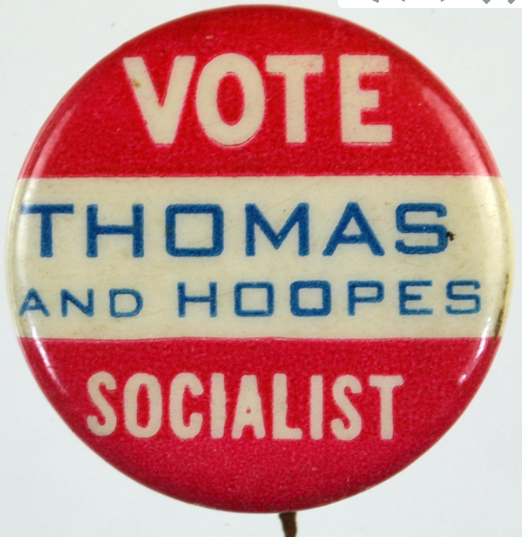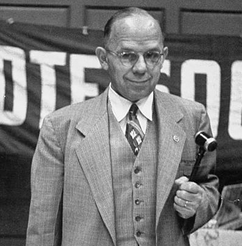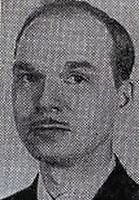Showing posts with label election of 1944. Show all posts
Showing posts with label election of 1944. Show all posts
Sunday, July 28, 2019
Andrew Nathan Johnson
Andrew Nathan Johnson, September 21, 1875 (Jackson County, Ky.) - August 30, 1959 (Lexington, Ky.)
VP candidate for Prohibition Party (1944)
Running mate with nominee: Claude A. Watson (1885-1978)
Popular vote: 74,758 (0.16%)
Electoral vote: 0/531
The campaign:
Claude A. Watson, who had been the running mate in 1935, was nominated in Nov. 1943 for President and Rev. Floyd C. Carrier was selected as the VP. Carrier developed some health problems and was replaced by Rev. Andrew Nathan Johnson in January 1944.
In addition to proposing a single six-year term of office for the Presidency, the 1944 Prohibition Party platform continued the open appeal to Christian churches as it had in 1940:
True Use of the Ballot:
We pledge our support to the original purpose of the ballot, which is to register the individual voter's conviction on principle, and not merely to elect persons to office. We recognize church leaders, pastors, church officials, members and editors of Christian literature as very influential on behalf of higher standards of political action, and we urge them to recognize and teach the true use of the ballot for principle. We urge them to unite in this party, which upholds righteousness as implied in the Ten Great Comandments and the Golden Rule.
The Liquor Problem:
Right thinking people are alarmed at the rapidly growing peril of the liquor power as now manifested:
1. Inflicting the alcoholic appetite upon millions of girls and women.
2. In multiplying juvenile delinquency.
3. In increasing gambling, vice and all kinds of crime.
4. In combating the efforts of the church and other moral forces.
5. In dominating our great organs of public opinion.
6. In subjecting political leaders and parties to its control.
7. In delaying, if not endangering, the success of our war effort.
The re-legalizing of the liquor traffic has brought about the worst moral reaction of modern times. Present conditions are due directly to the action of Government in restoring the liquor power through repeal of the Eighteenth Amendment, and repeal was due directly to the platform pledges of both the old parties in the 1932 presidential campaign.
Of all the wrongs committed by Government none has been worse than the authorizing of the liquor traffic to degenerate our own citizenship.
Watson was denied permission for priority airplane travel or to buy a new car for the campaign by war rationing agents. By and by he apparently was given his air travel rights and was issued extra gasoline for campaigning by auto. Watson also made the news when his brother was arrested on a DWI charge in Feb. 1944.
On the ballot in a couple dozen states, they finished strongest in Oregon (0.49%) and Alabama (0.45%)
Election history:
1908 - US House of Representatives (Ky.) (Prohibition Party) - defeated
1943 - Governor of Kentucky (Prohibition Party) - defeated
Other occupations: Methodist minister
Buried: Wilmore Cemetery (Wilmore, Ky.)
Notes:
Graduated Asbury College 1903, DD from Ohio Northern University, PhD from Milton University
(Pennsylvania?).
Buried in the same cemetery as Leander Lycurgus Pickett (1859-1928) who was the VP candidate for
the American Party in 1924 and made a trustee of Asbury College one year after Johnson graduated.
Saturday, July 27, 2019
Darlington Hoopes
James Hudson Maurer, 1928-1932 SPA VP nominee and Hoopes (left) in 1932
Darlington Hoopes, September 11, 1896 (Vale, Md.) – September 25, 1989 (Sinking Spring, Penn.)
VP candidate for Socialist Party of America (1944)
Running mate with nominee: Norman M. Thomas (1884-1968)
Popular vote: 79,017 (0.16%)
Electoral vote: 0/531
The campaign:
Norman Thomas, who had already run for President four times, was wanting to hand the torch to a younger generation and that hope rested on the 1940 VP nominee and second in command Maynard Kreuger. But Kreuger did not want it. So once again Thomas accepted the Presidential nomination in what was becoming a personality-driven rather than process-driven political party. Darlington Hoopes, much more of a centrist than Kreuger, was selected as the running mate. Hoopes was from the Socialist hotbed of Reading, Penn. and had experience as an elected SPA public servant passing legislation on child labor.
It was during this campaign Thomas supposedly said in a speech: "The American people will never knowingly adopt socialism. But, under the name of 'liberalism,' they will adopt every fragment of the socialist program, until one day America will be a socialist nation, without knowing how it happened ... I no longer need to run as a Presidential Candidate for the Socialist Party. The Democratic Party has adopted our platform." According to Snopes this is a bogus quote but it is repeated frequently by those on the Right as a form of confirmation bias without giving any source of the utterance. However, it is true that many of the Socialist ideas were co-opted by both of the major parties, but the capitalist system remained essentially intact and dominant, even under FDR.
After initially opposing America's entry into WWII, Thomas and the SPA supported the war effort but had fears of the USA entering a period of endless militarism and he anticipated the Cold War. "Sooner or later the USSR ... is bound to forget its present alliance and to aid native revolt against white-predominately British-supremacy. If we fight again with and for Britain ... it will be a terrible and unsuccessful [third world] war. That war, or long sustained preparation for it, will doom our democracy."
Thomas was one of the very few people (along with J. Edgar Hoover!!) to speak out against the internment of Japanese Americans.
The resulting national vote was the worst in the history of the SPA. With votes recorded from 29 states, including some where they were only write-ins, they didn't crack 1% in any of them-- although in Wisconsin, once a SPA stronghold, they finished with 0.99%.
Election history:
1929 - Judge, Berks County, Penn. - defeated
1931-1936 - Pennsylvania House of Representatives (Socialist Party of America)
1936-1940 - City Solicitor (Reading, Penn.)
1936 - Pennsylvania House of Representatives (Socialist Party of America) - defeated
1938 - Pennsylvania House of Representatives (Socialist Party of America) - defeated
1940 - Pennsylvania House of Representatives (Socialist Party of America) - defeated
1942 - Pennsylvania House of Representatives (Socialist Party of America) - defeated
1944 - Pennsylvania House of Representatives (Socialist Party of America) - defeated
1950 - Pennsylvania State Senate (Socialist Party of America) - defeated
1950 - US House of Representatives (Penn.) (Socialist Party of America) - defeated
1952 - US House of Representatives (Penn.) (Socialist Party of America) - defeated
1952 - US President (Socialist Party of America) - defeated
1956 - US President (Socialist Party of America) - defeated
1958 - US House of Representatives (Penn.) (Socialist Party of America) - defeated
Other occupations: attorney
Buried: Maidencreek Friends Meeting Burial Ground (Berks County, Penn.)
Notes:
Attended Quaker school.
Joined the Socialist Party of America in 1914.
Was part of the "Old Guard" that split from the SPA in 1936-1937 and formed the Social Democratic
Federation. He later returned.
A member of the Darlington-Butler political dynasty in Pennsylvania, including 5 members of US Congress.
Friday, July 26, 2019
Arla Allen Albaugh
Arla Allen Albaugh, Mar. 7, 1906 (Denison, Ohio) - Jan. 15, 2003 (Oakland Park, Fla.)
VP candidate for Socialist Labor Party (1944)
Running mate with nominee: Edward A. Teichert (1903-1981)
Popular vote: 45,188 (0.09%)
Electoral vote: 0/531
The campaign:
The beginning sentences in the Socialist Labor Party's 1944 platform anticipated life after WWII:
Our society stands where the road forks. The signs are plainly marked. One points to a continuation of capitalism. It leads to a postwar world of chronic economic crisis, of idle factories and idle men, of spreading anti-Semitism and racism, of fascist controls and Stateism, and of the perpetual struggle and war. The other points to Socialism-- a world of social ownership, democratic management of the industries, jobs and plenty for all, human brotherhood, and enduring peace.
The Party nominated Edward A. Teichert, the younger brother of SLP 1936 VP nominee Emil F. Teichert, for President. Arla A. Albaugh of Massillon, Ohio (where Jacob Coxey had once served as Mayor) was selected as the running mate. A seasoned SLP speaker, Albaugh hit the campaign trail and also used the radio as a communication tool.
With recorded votes from 11 states, they had their best result in New Jersey, placing 3rd with 0.35%.
Election history:
1946 - Governor of Ohio (Socialist Labor Party) - defeated
1962 - US Senate (Penn.) (Socialist Labor Party) - defeated
1964 - Pennsylvania State Auditor General (Socialist Labor Party) - defeated
Other occupations: photoengraver, lecturer
Buried: ?
Notes:
Joined SLP in 1934.
Was still active in the SLP 1993 from Dade Co. Fla.
Thursday, July 25, 2019
Harry Adolph Romer
Harry Adolph Romer, December 9, 1895 (Ohio) - March 24, 1953 (St. Henry, Ohio)
VP candidate for America First Party (1944)
VP candidate for Christian Nationalist Party (1948)
Running mate with nominee (1944, 1948): Gerald L. K. Smith (1898-1976)
Popular vote (1944): 1780 (0.00%)
Popular vote (1948): 42 (0.00%)
Electoral vote (1944, 1948): 0/531
The campaign (1944):
Gerald L.K. Smith-- Disciples of Christ minister, isolationist, fascist sympathizer, anti-Semite, white supremacist, and Holocaust denier-- split from the Republicans and formed his America First Party in 1944. He appropriated the name of the America First Committee (who denied any connection with Smith).
Charles Lindbergh was Smith's first choice as a the Presidential nominee, but as that failed to materialize Smith took the helm instead. Ultraconservative Ohio Gov. John Bricker was chosen as the running mate. Trouble was, Bricker was already the Republican vice-presidential nominee, and he did not take kindly to being associated with the America First Party. Here are some of the Governor's reactions:
"I know nothing about it. I know no one connected with it. I shall not permit my name to be used in any such connection. I am a candidate for vice-president on the Republican ticket only."
"The act of Smith, in associating my name with his on a spurious ticket without any notice of any kind whatsoever, is the cheapest of demagoguery. I denounce it and shall not have my name used in any such connection."
"I hate demagoguery, religious intolerance and racial prejudice. They can destroy our free government, as they have destroyed liberty around the world. I shall fight them as long as I am in public office or as long as I live."
"The right of religious worship according to one’s own conscience is protected to every American citizen in the bill of rights. The men and women of our armed forces are fighting and dying to preserve that precious right. We must preserve it here at home."
Bricker's replacement on the ticket was found in the person of Harry A. Romer, based in St. Henry, Ohio and one of Father Coughlin's associates and organizers.
Some selections from Romer's acceptance speech:
-We cannot entrust the making of a lasting peace to a controlled press and radio, present day educators and unchristian politicians. We must entrust the making of a lasting peace to a religious teaching of all Christian denominations, world minded statesmen, and Christian minded politicians. Our party believes in a Christian educational system for our public schools controlled by local school boards.
-In closing I want to say it and want to say it with pride. I was an ardent follower of Father Charles E. Coughlin. He has been and still is the greatest educator we have in the United States of America, and I hope we will soon hear his educational voice again over our National airways. I further hope he will sit in at our peace conference because it's men like him, men like the late Huey P. Long and our present day statesmen such as Nye, Wheeler, Reynolds, LaFollette, O'Daniels, Hoffman, Langer, Ford, Lindbergh, Fish, O'Connor, Holt, Lemke, Smith and others like them who are able to write a true and lasting peace.
In September Smith endorsed the Republican Dewey/Bricker ticket, saying by doing so he was simply laying the groundwork for an America First Party victory in 1948. The reasoning was not made clear.
On the ballot in two states: Michigan (0.06%) and Texas (0.02%) with a total of 1515 votes. Their remaining 200+ votes nationwide were write-ins. Smith claimed they were merely using Michigan as a "test" run.
The campaign (1948):
With a new party name-- the Christian Nationalist Party-- Smith made another attempt for the presidency. Romer was once again the running mate.
The platform opposed communism and "zionism." It supported segregation. It also called for closing the American borders to immigrants who were Jewish or non-white.
Just how far to the Populist Right on the racist and bigot chart this campaign had reached can be revealed by none other than pro-segregation South Carolina Gov. Strom Thurmond, the 1948 Dixiecrat nominee for President. When Smith and company attempted to form a political bridge with the Dixiecrats, Thurmond said, "We do not invite and do not need the support of Gerald L.K. Smith or any other rabble-rousers who use race prejudice and class hatred to inflame the emotions of the people." Yes, that's from Strom Thurmond.
The Smith/Romer ticket appears not to have been included in any ballots in spite of their efforts, so their result of a whopping 42 votes nationwide must have been write-ins. Supporters said 1952 would be their victorious year.
Election history: none.
Other occupations: machinist, merchant, funeral director, President of United Farmers of America, local American Legion commander and chaplain
Buried: Saint Henry Church Cemetery (Saint Henry, Ohio)
Notes:
Catholic.
Was an active Republican.
Felt that all Communists should be shot.
Tuesday, July 23, 2019
Frank Jefferies
Frank Jefferies, Aug. 4, 1874 (Bethlehem, Ind.) - June 14, 1947 (Rochester, Ind.)
VP candidate for Greenback Party (1944)
Running mate with nominee: Leo Charles Donnelly (1889-1958)
Popular vote: 0 (0.00%)
Electoral vote: 0/531
The campaign:
Greenback Party leader John Zahnd did not run a fifth time for President. Instead the 1944 nominee was Leo C. Donnelly, a pastor at Westminster Community Church in Detroit. He was also a fascist sympathizer and an associate of Father Charles Coughlin. Donnelly had run as a member of the Democratic Party for a few public offices in the past.
Donnelly was at one time a medical doctor. A graduate of the Detroit College of Medicine in 1911, he was suspended in 1924 by the Wayne County Medical Society and in the early 1930s his license was revoked by the State of Michigan for "unprofessional and dishonest" conduct.
His license was reinstated in 1947, three years after his Presidential run for office. At the start of May, 1958 he was arrested and charged with seven counts of fraud for basically victimizing vulnerable people using marketing by mail-order for such products as a cure for cancer and anti-radioactive fallout tablets. He was facing the possibility of over 30 years in prison. But before the month was over, he died of a heart attack on May 30, 1958.
Frank Jefferies, his running mate, seems to have been a Republican who was active in real estate.
The Donnelly/Jefferies ticket did not appear on any ballots, although one news account said they filed in Indiana, where the Greenback Party was headquartered (John Zahnd's house). Any votes they earned had to be write-ins.
Election history: none.
Other occupations: newspaper circulation manager, realtor, President of the South Bend Indiana Real Estate Board, soldier in Spanish-American War
Buried: Mount Hope Cemetery (Logansport, Ind.)
Notes:
Member of the Church of Christ.
His health began to fail in 1945. If elected, he would have died in office in 1947.
Sometimes his surname is spelled Jeffers or Jeferies or Jeffries by writers and reporters.
Moved to South Bend, Ind. ca. 1912
VP candidate for Greenback Party (1944)
Running mate with nominee: Leo Charles Donnelly (1889-1958)
Popular vote: 0 (0.00%)
Electoral vote: 0/531
The campaign:
Greenback Party leader John Zahnd did not run a fifth time for President. Instead the 1944 nominee was Leo C. Donnelly, a pastor at Westminster Community Church in Detroit. He was also a fascist sympathizer and an associate of Father Charles Coughlin. Donnelly had run as a member of the Democratic Party for a few public offices in the past.
Donnelly was at one time a medical doctor. A graduate of the Detroit College of Medicine in 1911, he was suspended in 1924 by the Wayne County Medical Society and in the early 1930s his license was revoked by the State of Michigan for "unprofessional and dishonest" conduct.
His license was reinstated in 1947, three years after his Presidential run for office. At the start of May, 1958 he was arrested and charged with seven counts of fraud for basically victimizing vulnerable people using marketing by mail-order for such products as a cure for cancer and anti-radioactive fallout tablets. He was facing the possibility of over 30 years in prison. But before the month was over, he died of a heart attack on May 30, 1958.
Frank Jefferies, his running mate, seems to have been a Republican who was active in real estate.
The Donnelly/Jefferies ticket did not appear on any ballots, although one news account said they filed in Indiana, where the Greenback Party was headquartered (John Zahnd's house). Any votes they earned had to be write-ins.
Election history: none.
Other occupations: newspaper circulation manager, realtor, President of the South Bend Indiana Real Estate Board, soldier in Spanish-American War
Buried: Mount Hope Cemetery (Logansport, Ind.)
Notes:
Member of the Church of Christ.
His health began to fail in 1945. If elected, he would have died in office in 1947.
Sometimes his surname is spelled Jeffers or Jeferies or Jeffries by writers and reporters.
Moved to South Bend, Ind. ca. 1912
Subscribe to:
Comments (Atom)
















